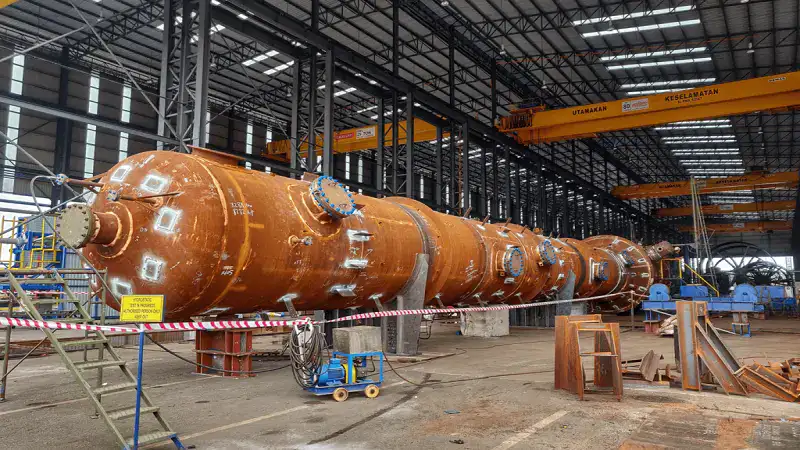Field-fabricated vessels are essential components in many industries, including pharmaceuticals, food and beverage, chemical processing, and energy production. They are constructed on-site, allowing for customization and optimization that pre-fabricated options might not offer. The ability to design and build these vessels in the field ensures they meet the specific requirements and constraints of the operating environment.
This guide post explores ten innovative designs for field-fabricated vessels that enhance efficiency, safety, and functionality. These cutting-edge designs illustrate how advanced engineering and technology can create vessels tailored to the unique demands of various industries.
1. Modular Field Fabricated Vessels
Modular designs have revolutionised field fabrication by allowing vessel sections to be prefabricated and assembled on-site. This approach reduces construction time and costs, while ensuring high-quality standards. Modular vessels are particularly beneficial for projects with tight deadlines or limited access to the construction site.
2. Double-Wall Containment Vessels
Safety is paramount in industries dealing with hazardous materials. Double-wall containment vessels offer an extra layer of protection by incorporating a secondary barrier to prevent leaks and spills. These vessels are designed with an inner and outer wall, with a monitoring system to detect any breaches, ensuring maximum safety and environmental protection.
3. High-Pressure Vessels
High-pressure vessels are designed to withstand extreme pressures, making them ideal for oil and gas or chemical processing industries. These vessels are constructed with robust materials and advanced welding techniques to ensure they can operate safely under high-pressure conditions. For more information on Field Fabricated Vessels, check out Feldmeier’s field service offerings.
4. Cryogenic Vessels
Cryogenic vessels store and transport liquefied gases at extremely low temperatures. These vessels are designed with unique insulation materials to maintain the low temperatures required for substances like liquid nitrogen or oxygen. Innovative cryogenic vessel designs include vacuum insulation and multi-layer composite materials to enhance thermal efficiency.
5. Custom Agitation Systems
Field fabricated vessels with custom agitation systems are tailored to specific processes that require mixing, blending, or maintaining a uniform solution. These vessels can include various agitators, such as propellers, paddles, or magnetic stirrers, designed to optimize the mixing process for specific applications in the pharmaceutical or food and beverage industries.
6. Corrosion-Resistant Vessels
Industries dealing with corrosive substances need vessels that can withstand harsh chemical environments. Innovative designs of corrosion-resistant ships involve using advanced materials like stainless steel, titanium, or specialised coatings. These materials prevent degradation and extend the vessel’s lifespan, ensuring long-term reliability and safety.
7. Bioreactors
Bioreactors are specialised vessels used in the biotechnology and pharmaceutical industries for growing organisms or cells under controlled conditions. Innovative bioreactor designs include precise temperature and pH control, advanced monitoring systems, and the ability to scale up or down based on production needs. These vessels are crucial for processes like fermentation or cell culture.
8. Heat Exchanger Vessels
Heat exchanger vessels are designed to transfer heat between two or more fluids efficiently. These vessels are essential in industries where temperature control is critical. Innovative designs include spiral heat exchangers, plate heat exchangers, and shell-and-tube heat exchangers, each offering unique advantages in terms of efficiency, space-saving, and ease of maintenance.
9. Sanitary Vessels
Sanitary vessels are designed for industries that require strict hygiene standards, such as food and beverage or pharmaceuticals. These vessels feature smooth, polished surfaces and seamless construction to prevent contamination and facilitate easy cleaning. Innovative designs include automated cleaning systems (CIP/SIP) to ensure thorough sanitation without manual intervention.
10. Multi-Purpose Vessels
Multi-purpose vessels are versatile designs that can be adapted for various processes within a single unit. These vessels can be configured for different applications, such as storage, mixing, heating, or cooling, depending on the operation’s needs. The flexibility of multi-purpose vessels makes them a cost-effective and space-saving solution for many industries.
FAQs
What are the advantages of field fabricated vessels over pre-fabricated ones?
Field fabricated vessels offer several advantages, including customization to specific site requirements, the ability to construct larger vessels that cannot be transported easily, and the opportunity to make adjustments during construction. This flexibility ensures the vessel meets the exact needs of the application and site conditions.
How long does it typically take to fabricate and install a field-fabricated vessel?
The timeline for fabricating and installing a field-fabricated vessel varies depending on its complexity and size. It can take anywhere from a few weeks to several months. Site conditions, material availability, and specific design requirements can influence the duration.
What materials are commonly used in the construction of field-fabricated vessels?
Common materials for constructing field fabricated vessels include stainless steel, carbon steel, titanium, and specialised alloys. The choice of material depends on the intended application, operating conditions, and the substances being stored or processed. Corrosion resistance, strength, and durability are key considerations in material selection.
Are field fabricated vessels subject to regulatory standards and inspections?
Yes, field fabricated vessels must comply with industry-specific regulatory standards and undergo inspections to ensure they meet safety and quality requirements. Organisations such as the American Society of Mechanical Engineers (ASME) and the European Pressure Equipment Directive (PED) provide guidelines and certifications for vessel construction and operation.
Conclusion
Field-fabricated vessels are crucial in many industries, offering customized solutions that meet specific operational requirements. From modular designs and double-wall containment to high-pressure and cryogenic vessels, these innovative designs enhance efficiency, safety, and functionality. By understanding the unique advantages of each design, industries can select the most suitable vessel for their needs.
For expert assistance and innovative field fabricated vessel designs, consider partnering with Feldmeier Equipment. Their extensive experience and commitment to quality ensure that you receive the best solutions for your specific applications.
